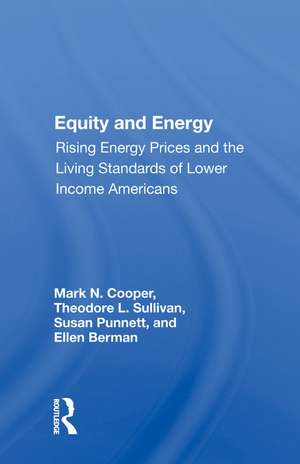Equity And Energy: Rising Energy Prices And The Living Standards Of Lower Income Americans
Autor Mark N. Cooperen Limba Engleză Hardback – 7 iun 2019
Preț: 764.20 lei
Preț vechi: 1027.40 lei
-26% Nou
Puncte Express: 1146
Preț estimativ în valută:
146.27€ • 152.12$ • 122.57£
146.27€ • 152.12$ • 122.57£
Carte tipărită la comandă
Livrare economică 13-27 martie
Preluare comenzi: 021 569.72.76
Specificații
ISBN-13: 9780367020446
ISBN-10: 0367020440
Pagini: 318
Dimensiuni: 152 x 229 mm
Greutate: 0.45 kg
Ediția:1
Editura: Taylor & Francis
Colecția Routledge
Locul publicării:Oxford, United Kingdom
ISBN-10: 0367020440
Pagini: 318
Dimensiuni: 152 x 229 mm
Greutate: 0.45 kg
Ediția:1
Editura: Taylor & Francis
Colecția Routledge
Locul publicării:Oxford, United Kingdom
Cuprins
Westview Replica Editions -- Introduction: A Decade of Despair -- Basic Issues -- The Social Question -- The Macroeconomic Background -- Household Impacts -- Energy Consumption in the Home -- Gasoline Consumption and Expenditures -- The Loss of Purchasing Power Suffered by Lower Income Households -- Rising Energy Prices and the Lower Income Rental Housing Market -- The Crisis in the Rental Housing Market and the Role of Energy Prices -- An Assessment of the Impact of Rising Energy Prices on the Low Income Rental Housing Market -- Rising Energy Prices and the Delivery of Public Services -- Public Services and the Lower Income Population -- The Impact of Rising Energy Prices on the Delivery of Public Services -- The End of the Decade -- Methodological Appendix
Descriere
Arguing that the energy price policies of the 1970s represented a major equity/efficiency trade-off and led to a dramatic deterioration in the living standard of lower income households, the authors of this book present a comprehensive data-based assessment of the plight of lower income households during the decade of 1973-1983. After a general review of the recessionary and inflationary impact of rising energy prices on the national economy, they present detailed empirical assessments of three trends adversely affecting lower income households: (1) the rising share of household energy expenditures as a percentage of household income and the failure of income transfer programs to offset losses in purchasing power; (2) the rapid increase in energy-related operating costs in lower income rental housing and the coincident decline in the quality of housing; and (3) the rapid increase in energy-related operating costs of local governments which strained local fiscal resources and led to a cutback in the provision of redistributive services (such as health, education, and welfare) and a shift toward regressive taxes. The authors conclude that damage to the national economy and to the living standards of lower income households remains severe; price trends of the 1980s, they emphasize, represent only slight moderations of earlier trends, while the vulnerability to future energy price shocks has been reduced very little. The need for effective policy responses is even greater now than in the first decade of the energy crisis.
